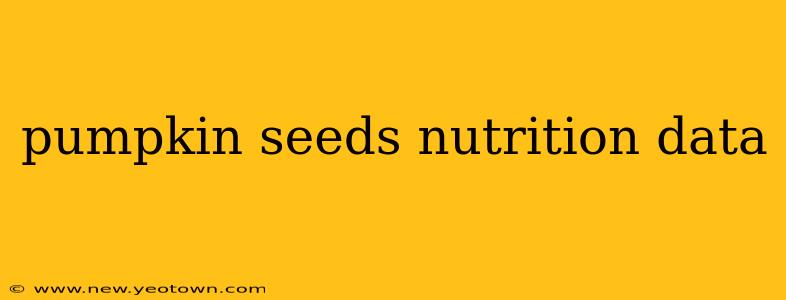The humble pumpkin seed – often overlooked after carving your Halloween jack-o'-lantern – is a nutritional superstar. These tiny, green gems are bursting with vitamins, minerals, and healthy fats, offering a surprising array of benefits for your health. Let's delve into the fascinating world of pumpkin seed nutrition, exploring their impressive nutrient profile and uncovering the reasons why you should add them to your diet.
My journey into the world of pumpkin seed nutrition began with a simple question: Are these tiny seeds really as good for me as people say? What started as a casual inquiry quickly transformed into a deep dive into scientific research and nutritional analysis. I discovered a wealth of information highlighting the impressive benefits of this often-underappreciated food. This article is the result of that journey, and I hope it will illuminate the incredible nutritional value of pumpkin seeds for you.
What are the nutritional benefits of pumpkin seeds?
Pumpkin seeds are a nutritional powerhouse, boasting a remarkable profile of essential nutrients. They're an excellent source of:
-
Healthy Fats: Pumpkin seeds are rich in monounsaturated and polyunsaturated fatty acids, including omega-3 and omega-6 fatty acids, crucial for heart health and brain function. These healthy fats contribute to lower cholesterol levels and reduce the risk of chronic diseases.
-
Protein: These seeds are a complete protein source, meaning they contain all nine essential amino acids your body needs but can't produce on its own. This makes them an ideal addition to vegetarian and vegan diets.
-
Fiber: Pumpkin seeds are a good source of dietary fiber, which aids digestion, promotes regularity, and helps you feel full and satisfied, contributing to weight management.
-
Vitamins and Minerals: They are packed with various vitamins and minerals, including magnesium, zinc, iron, manganese, phosphorus, and vitamin K. These nutrients play vital roles in numerous bodily functions, from bone health to immune function.
What are the health benefits of eating pumpkin seeds?
The impressive nutritional profile of pumpkin seeds translates into a wide range of potential health benefits:
-
Improved Heart Health: The healthy fats, fiber, and magnesium in pumpkin seeds contribute to maintaining healthy blood pressure and cholesterol levels, reducing the risk of heart disease.
-
Enhanced Brain Function: The omega-3 fatty acids and zinc in pumpkin seeds support healthy brain function and cognitive health.
-
Boosted Immune System: The abundance of vitamins and minerals, particularly zinc and vitamin K, strengthens the immune system and helps the body fight off infections.
-
Better Sleep: Pumpkin seeds are a good source of tryptophan, an amino acid that the body converts to serotonin and melatonin, which promote relaxation and improve sleep quality.
-
Improved Prostate Health: Some studies suggest that pumpkin seeds may help alleviate symptoms of benign prostatic hyperplasia (BPH) due to their high zinc content.
Are pumpkin seeds good for weight loss?
While pumpkin seeds are nutrient-dense, they are also calorie-dense. Therefore, moderation is key. However, their high fiber and protein content can contribute to weight management by promoting satiety and helping you feel full for longer periods, potentially reducing overall calorie intake. Including them as part of a balanced diet and exercise plan can be beneficial for weight loss efforts.
How many pumpkin seeds should I eat per day?
The recommended daily intake of pumpkin seeds varies depending on individual needs and overall dietary goals. A small handful (around 1 ounce or 30 grams) is a good starting point. It's important to listen to your body and adjust your intake accordingly. Excessive consumption can lead to an upset stomach or other digestive issues.
Are there any side effects of eating pumpkin seeds?
While generally safe for consumption, excessive intake of pumpkin seeds can lead to some side effects, such as:
-
Digestive issues: Consuming large quantities can cause bloating, gas, and diarrhea.
-
Phytic acid: Pumpkin seeds contain phytic acid, which can interfere with the absorption of certain minerals. However, soaking or sprouting the seeds can reduce phytic acid levels.
-
Allergies: Some individuals may be allergic to pumpkin seeds.
How can I incorporate pumpkin seeds into my diet?
Pumpkin seeds are incredibly versatile and can be easily incorporated into your diet in various ways:
-
Snack on them plain: A handful of roasted pumpkin seeds makes a healthy and satisfying snack.
-
Add them to salads: Sprinkle roasted pumpkin seeds over your favorite salad for added crunch and nutrients.
-
Include them in yogurt or oatmeal: Add a spoonful of pumpkin seeds to your breakfast bowl for extra protein and fiber.
-
Use them in baking: Pumpkin seeds can be added to muffins, breads, and other baked goods for added flavor and texture.
In conclusion, pumpkin seeds are a truly remarkable food, offering a wealth of nutritional benefits and contributing to overall health and well-being. By incorporating them into your diet in moderation, you can harness their power to improve your health and enjoy their delicious taste. Remember, moderation and a balanced diet are always key to optimal health.

